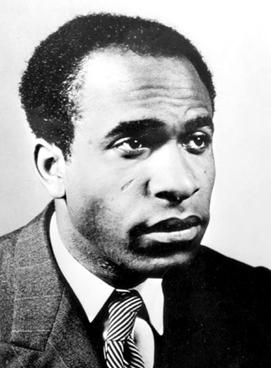More languages
More actions
(added infobox and link) Tag: Visual edit |
No edit summary Tag: Visual edit |
||
| Line 1: | Line 1: | ||
{{Infobox person|name=Frantz Fanon|image=Frantz_Fanon.png|birth_date=July 20, 1925|death_date=December 6, 1961 (aged 36)|death_cause=Leukemia|death_place=Bethesda, Maryland, [[USA]]|birth_place=Fort-de-France, Martinique, French West Indies|known=[[Black Skin, White Masks]], [[The Wretched of the Earth]]}} | {{Infobox person|name=Frantz Fanon|image=Frantz_Fanon.png|birth_date=July 20, 1925|death_date=December 6, 1961 (aged 36)|death_cause=Leukemia|death_place=Bethesda, Maryland, [[USA]]|birth_place=Fort-de-France, [[Martinique]], French West Indies|known=''[[Black Skin, White Masks]]'', ''[[The Wretched of the Earth]]''}} | ||
'''Frantz Fanon''' (July 20, 1925 - December 6, 1961) was a psychiatrist, [[Anti-colonialism|anti-colonial]] political theorist, author, and revolutionary from the [[Caribbean]] island of [[Martinique]]. He is the author of various works including ''[[Black Skin, White Masks]]'' (1952) and ''[[Library:The Wretched of the Earth|The Wretched of the Earth]]'' (1961). Born as a colonial [[French Republic|French]] subject, he eventually travelled to France for his education in psychiatry. In the latter portion of his life, he was involved with the [[National Liberation Front (Algeria)|Algerian National Liberation Front]] (French: ''Front de Libération Nationale;'' FLN) in the [[People's Democratic Republic of Algeria|Algerian]] independence struggle against the French.<ref>[https://www.telesurenglish.net/multimedia/Remembering-Algerian-Revolutionary-Frantz-Fanon-20171206-0026.html “Remembering Algerian Revolutionary Frantz Fanon.”] teleSUR, Dec. 6, 2017. [https://web.archive.org/web/20220818144242/https://www.telesurenglish.net/multimedia/Remembering-Algerian-Revolutionary-Frantz-Fanon-20171206-0026.html Archived] 2022-08-18.</ref> He also worked in [[Republic of Tunisia|Tunisia]] with Algerian independence forces, and served as the Ambassador to [[Republic of Ghana|Ghana]] for the [[Provisional Algerian Government]]. He passed away in 1961, after | '''Frantz Fanon''' (July 20, 1925 - December 6, 1961) was a psychiatrist, [[Anti-colonialism|anti-colonial]] political theorist, author, and revolutionary from the [[Caribbean]] island of [[Martinique]]. He is the author of various works including ''[[Black Skin, White Masks]]'' (1952) and ''[[Library:The Wretched of the Earth|The Wretched of the Earth]]'' (1961). Born as a [[Colonialism|colonial]] [[French Republic|French]] subject, he eventually travelled to France for his education in psychiatry. In the latter portion of his life, he was involved with the [[National Liberation Front (Algeria)|Algerian National Liberation Front]] (French: ''Front de Libération Nationale;'' FLN) in the [[People's Democratic Republic of Algeria|Algerian]] independence struggle against the French.<ref>[https://www.telesurenglish.net/multimedia/Remembering-Algerian-Revolutionary-Frantz-Fanon-20171206-0026.html “Remembering Algerian Revolutionary Frantz Fanon.”] teleSUR, Dec. 6, 2017. [https://web.archive.org/web/20220818144242/https://www.telesurenglish.net/multimedia/Remembering-Algerian-Revolutionary-Frantz-Fanon-20171206-0026.html Archived] 2022-08-18.</ref> He also worked in [[Republic of Tunisia|Tunisia]] with Algerian independence forces, and served as the Ambassador to [[Republic of Ghana|Ghana]] for the [[Provisional Algerian Government]]. He passed away in 1961, after being diagnosed with leukemia.<ref name=":0">[https://www.telesurenglish.net/analysis/Martinique-and-Algerias-Fanon-Remembered-20140716-0004.html “Martinique and Algeria’s Franz Fanon Remembered.”] teleSUR. 2016. [https://web.archive.org/web/20230319140816/https://www.telesurenglish.net/analysis/Martinique-and-Algerias-Fanon-Remembered-20140716-0004.html Archived] 2023-03-19.</ref> | ||
Fanon's political thought deals heavily with the implications and consequences of [[Colonialism|colonization]], focusing considerably on anti-colonial struggles of his time as well as on the effects of colonization on the human psyche. | Fanon's political thought deals heavily with the implications and consequences of [[Colonialism|colonization]], focusing considerably on anti-colonial struggles of his time as well as on the effects of colonization on the human psyche. | ||
In 1953, Fanon was named the Head of the Psychiatry Department of the Blida-Joinville Hospital in Algeria. There, via his patients, Fanon gained increased insight into the torture and brutality ongoing under French rule. In 1956, Fanon resigned from his position with the French government to struggle for Algerian independence.<ref name=":0" /><ref>Drabinski, John. [https://plato.stanford.edu/entries/frantz-fanon/#WretEart "Frantz Fanon."] Stanford Encyclopedia of Philosophy. Stanford.edu. Mar 14, 2019. [https://web.archive.org/web/20230319135558/https://plato.stanford.edu/entries/frantz-fanon/#WretEart Archived] 2023-03-19.</ref> | In 1953, Fanon was named the Head of the Psychiatry Department of the Blida-Joinville Hospital in Algeria. There, via his patients, Fanon gained increased insight into the torture and brutality ongoing under French rule. In 1956, Fanon resigned from his position with the French government to struggle for Algerian independence.<ref name=":0" /><ref>Drabinski, John. [https://plato.stanford.edu/entries/frantz-fanon/#WretEart "Frantz Fanon."] Stanford Encyclopedia of Philosophy. Stanford.edu. Mar 14, 2019. [https://web.archive.org/web/20230319135558/https://plato.stanford.edu/entries/frantz-fanon/#WretEart Archived] 2023-03-19.</ref> He documented French atrocities for the French and Algerian media.<ref name=":12222">{{Citation|author=[[Vijay Prashad]]|year=2008|title=The Darker Nations: A People's History of the Third World|chapter=Algiers|page=121|pdf=https://cloudflare-ipfs.com/ipfs/bafykbzaceascnzh26r5d6uitjjs2z7rflhaxlt7rboz5whzdf76qg6xxvecqq?filename=%28A%20New%20Press%20People%27s%20history%29%20Vijay%20Prashad%20-%20The%20darker%20nations_%20a%20people%27s%20history%20of%20the%20third%20world-The%20New%20Press%20%282008%29.pdf|publisher=The New Press|isbn=9781595583420|lg=https://libgen.rs/book/index.php?md5=9B40B96E830128A7FE0E0E887C06829F}}</ref> | ||
== References == | == References == | ||
<references /> | <references /> | ||
[[Category:Revolutionaries]] | [[Category:Revolutionaries]] | ||
Revision as of 13:23, 21 June 2023
Frantz Fanon | |
|---|---|
 | |
| Born | July 20, 1925 Fort-de-France, Martinique, French West Indies |
| Died | December 6, 1961 (aged 36) Bethesda, Maryland, USA |
| Cause of death | Leukemia |
| Known for | Black Skin, White Masks, The Wretched of the Earth |
Frantz Fanon (July 20, 1925 - December 6, 1961) was a psychiatrist, anti-colonial political theorist, author, and revolutionary from the Caribbean island of Martinique. He is the author of various works including Black Skin, White Masks (1952) and The Wretched of the Earth (1961). Born as a colonial French subject, he eventually travelled to France for his education in psychiatry. In the latter portion of his life, he was involved with the Algerian National Liberation Front (French: Front de Libération Nationale; FLN) in the Algerian independence struggle against the French.[1] He also worked in Tunisia with Algerian independence forces, and served as the Ambassador to Ghana for the Provisional Algerian Government. He passed away in 1961, after being diagnosed with leukemia.[2]
Fanon's political thought deals heavily with the implications and consequences of colonization, focusing considerably on anti-colonial struggles of his time as well as on the effects of colonization on the human psyche.
In 1953, Fanon was named the Head of the Psychiatry Department of the Blida-Joinville Hospital in Algeria. There, via his patients, Fanon gained increased insight into the torture and brutality ongoing under French rule. In 1956, Fanon resigned from his position with the French government to struggle for Algerian independence.[2][3] He documented French atrocities for the French and Algerian media.[4]
References
- ↑ “Remembering Algerian Revolutionary Frantz Fanon.” teleSUR, Dec. 6, 2017. Archived 2022-08-18.
- ↑ 2.0 2.1 “Martinique and Algeria’s Franz Fanon Remembered.” teleSUR. 2016. Archived 2023-03-19.
- ↑ Drabinski, John. "Frantz Fanon." Stanford Encyclopedia of Philosophy. Stanford.edu. Mar 14, 2019. Archived 2023-03-19.
- ↑ Vijay Prashad (2008). The Darker Nations: A People's History of the Third World: 'Algiers' (p. 121). [PDF] The New Press. ISBN 9781595583420 [LG]
